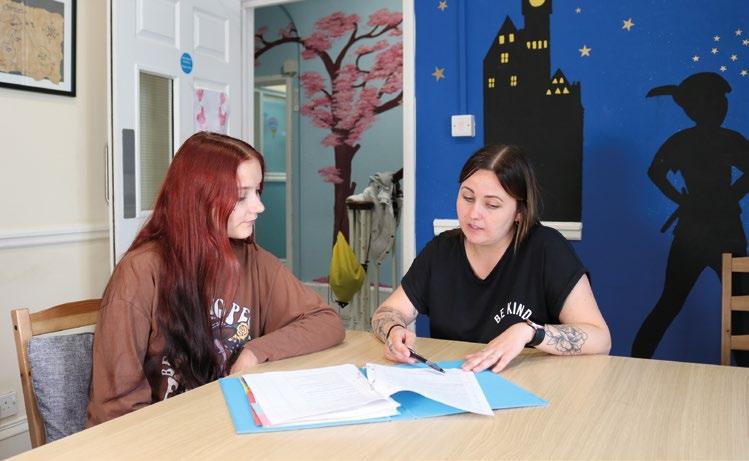Your guide to apprenticeships






Your guide to apprenticeships





You may be asking yourself, why should I study an apprenticeship? How will it benefit me?
We are an innovative college working with around 900 employers to deliver a wide range of apprenticeships in a variety of sectors, to suit your needs. We also deliver bespoke programmes with some of the largest employers across Wiltshire and the wider South West, meaning there is something for you.
What is an apprenticeship?
An apprenticeship is a job where you learn and gain experience as well as getting paid. You are an employee who will benefit from having the right skills and knowledge needed for your chosen career. Apprenticeships are a great alternative to traditional learning.
What are the benefits of apprenticeships?
• Earn a wage while you are training
• Learn job specific skills and gain practical experience
• Develop professionally alongside experienced colleagues
• Achieve nationally recognised qualifications
• Support from a dedicated college assessor
• Paid holiday
• Progression onto higher level qualifications or university
• Fast track into full-time employment
Am I eligible for an apprenticeship?
Anyone can be an apprentice, no matter if you’re a school leaver starting your career, wanting a career change, or looking to upskill your existing experience or qualifications. To be eligible you need to meet the following criteria:
• Aged 16 or over (there is no upper age limit)
• Have been living in the UK for 3 years prior to enrolling (some exemptions apply)
• Not in full-time education
• Meet the apprenticeship programme entry criteria
The minimum wage for an apprentice in the first 12 months is £6.40 per hour, then after 12 months, you’re paid the national minimum wage for your age. You may be paid more than this which is up to the employer’s discretion.
How does an apprenticeship work?
Apprenticeships are made up of competence, knowledge and behaviour elements. The competence element is undertaken in the workplace where you will learn the skills, knowledge and behaviours necessary to complete your chosen apprenticeship. The knowledge element is delivered via day or block release at college, or as part of a blended learning programme in the workplace. The delivery of the apprenticeship will depend on which programme you are enrolling on.
The behaviour element is developed in the workplace and is supported by your college assessor and your workplace mentor. They provide off-the-job training and assessments to ensure you are on track for your end point assessment (if applicable). The apprenticeship programmes vary in terms of GCSE entry requirements. You can check requirements for specific apprenticeship programmes by visiting our website or contacting our Student Recruitment Consultants by emailing apprenticeships@wiltshire.ac.uk or calling 0845 345 2235
Further
“Hairdressing is something I always wanted to do and I thought the best way to try to get into it was through an apprenticeship. I have really enjoyed doing it and I would definitely recommend starting an apprenticeship to someone if they really know the industry that they want to work in. I’ve had great support from my assessors at college and my employers.”
“Hospitality isn’t a career I ever thought about when I was at school. I did maths, physics and computer science at A-Level, so this is something I fell into but I have totally fallen in love with it. My advice to anyone who isn’t sure about their career path is to always keep your options open. You never know what is around the corner. This was something I was offered unexpectedly but I have ended up finding something that I really enjoy.”
“It was very daunting to go back to studying after such a long time since I finished at school. If I am honest, I wasn’t too forthcoming with the course work at the beginning but once I started to participate more, I began to really enjoy it. I am so glad and so proud that I managed to achieve it. It is never too late to develop your skills, and I am now supporting one of my colleagues as she is going through the same apprenticeship.”



Jacques Kinnison, Site Carpenter Apprentice of the Year
Level 2 Site Carpenter
“I always had an interest in doing something to do with construction or a trade, but I never really knew exactly what it was that I wanted to do. When I was at school, I always enjoyed working with wood in Design & Technology lessons, so carpentry was something I started to think about. Initially I was just working for James as a labourer but when I found the apprenticeship I started to push to try to do it. He really supported me and said: ‘Yes, go and do it’. I am really grateful for his help and the support of my colleagues and college assessors.”
Oliver
Technician
Level 3 Science Industry Maintenance Technician (SIMT)
“It wasn’t easy to make the decision to go back to studying as I was earning good money beforehand, but I wasn’t enjoying the role I was in. I was a business improvement manager for a recruitment company, but engineering was something I always wanted to do – I just went down the wrong path. It was a bit of a leap of faith, but it was definitely worth it.”


“I am so glad and so proud that I managed to achieve it. It is never too late to develop your skills.”
Lavena Welch, Team Leader Apprentice of the Year
You will need to Register for an apprentice account at www.findapprenticeship.service.gov.uk/ register. This account will enable you to browse, set up alerts regarding new vacancies and apply for apprenticeships. Please note, it is free to register and once you have completed your details, you will be sent an activation code via email to activate your account which must be done within 30 days.
You must have an employer in order for an apprenticeship to work. You can search for an apprenticeship in several ways:
1
2
Search for current vacancies, save searches and set up alerts on the Government website
Using the account you set up, you can search using keywords, occupation type, job role or postcode to suit your criteria. Each vacancy listing gives detailed information about the job, including the employer, training provider, pay and the qualification you will be working towards.
Make your searches easy to access at any time by saving them and opting to receive alerts. To save your search click ‘Receive alerts for this search’ at the top left hand side of the screen.
Browse our current vacancies
• Go to wiltshire.ac.uk/apprenticeships
• Scroll down and click ‘Current Vacancies’ to see the full list of Wiltshire College & University Centre apprenticeship vacancies.
• If there is a vacancy that interests you then click ‘Apply’ and you will be directed to the correct advert on the Gov.uk website - this is where you sign in using the account details you have registered with.
3
If you have an employer that you’d like to work for, you could send them a cover letter and your CV offering to do work experience which may lead to you being taken on as an apprentice.
If you already have an employer and they have agreed to put you through an apprenticeship, contact our Apprenticeship Team and we’ll get you started.
Email apprenticeships@wiltshire.ac.uk or call 0845 345 2235
Once you have applied for a vacancy on www.gov.uk/apply-apprenticeship, your application will be reviewed and sent to the employer for their consideration. They will contact you directly if they wish to invite you for an interview. If you are offered the apprenticeship position, Wiltshire College and University Centre will contact you with a link to complete a course application form and some pre-enrolment assessments.
If you’re under 19, you may also want to apply for a fulltime course as your back-up option whilst you are trying to secure an employer for the apprenticeship.

Wiltshire College & University Centre currently offers over 60 different apprenticeships. These are increasingly becoming more specialised with pathways designed to suit specific job roles within a business and meet employers’ needs.








